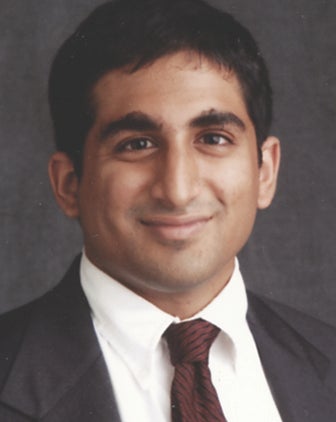
Subscribe to Pittwire Today
Get the most interesting and important stories from the University of Pittsburgh.School of Medicine Alumnus Devotes Skills, Time to Treating People in Conflict Zones
This story, written by Kristin Bundy, first appeared in the summer 2017 issue of Pitt Med magazine.
Wounded men, women and children arrived by the truckload at the makeshift emergency bay of the chicken farm-turned-hospital. Brian D’Cruz and a dozen other Doctors Without Borders health care workers — all of whom volunteered to work in northern Syria — rushed to their aid. Scores of civilians had been targets of bombings that day in the lush, mountainous region near the Turkish border. D’Cruz remembers that three people died. Had the hospital not been there, he said, there would have been at least 20 more. “That was my best day in Syria.”
When Doctors Without Borders (aka Médecins Sans Frontières, or MSF) first approached D’Cruz (MD ’04, Res ’07) about a project in Syria, he said no. Although he had been a part of prior missions in Chad, the Republic of the Congo and the Central African Republic, he was especially worried about security in the Middle East.
After a few months, he had a change of heart. “Essentially, the more I read about it, the more I was seeing that people there just had no access to care,” recalled D’Cruz. “I’m an ER doctor, I work in a trauma center, I’m capable of doing that kind of work, and there’s a desperate need for people who are able to do it.” So, in August 2013, D’Cruz flew to Syria’s Idlib province for a two-month assignment.
The hospital where he worked, which originally began in a cave, had moved to the converted chicken farm (an industrial building fortified with concrete) because its location was relatively safe and the structure was solid. Generators provided power. “At the time, we were the most advanced hospital in the area,” D’Cruz remembers.
There, MSF served as a lifeline for people to receive the quality of medical attention they once had. Prior to the bombings, medical care in Syria was sophisticated and readily available. “Patients would carry copies of their MRIs and CTs (medical scans) and all the information they had before the war,” D’Cruz said. “That’s the first place I’ve ever worked with MSF where the medical care had been that advanced and then had essentially been taken away.” Soon after D’Cruz finished his assignment, MSF was forced to close the hospital. It could no longer guarantee the safety of the staff.
D’Cruz speaks fondly of the Syrian people he met, their beautiful countryside and their persistence in offering homemade meals as a gesture of appreciation. “They were just regular people like us. It was nice to see how different it wasn’t — even in the middle of a war.”Since Syria, D’Cruz has participated in three other MSF projects — two in conflict-ridden African countries and one in Guinea serving as the supervising medical doctor for a 90-bed Ebola treatment center.
In between his trips overseas, he works as an attending physician in the emergency department at Inova Fairfax Hospital outside Washington, D.C. He said the hospital and his colleagues fully support his volunteer work. “They trade and cover shifts for me so I’m able to go. A lot of them have told me, ‘I’m not able to do what you’re doing, so I’ll make it possible for you to do it. I’ll work in your place so that you can go.’”
D’Cruz has always been drawn to providing medical care during a crisis — something he calls limited-resource disaster response. When he was a Pitt resident, he helped medical teams in New Orleans and Baton Rouge after Hurricane Katrina. In 2011, he went to Haiti after the earthquake. It was in Haiti, while working for another organization, where he first saw MSF in action and applied to be part of their volunteer team.
A labor of love for D’Cruz, providing trauma relief drives his practice forward. “That’s part of the reason why I went into medicine — to take care of lots of sick people who don’t have anywhere else to go. Even though it’s horrible that those things happen, it’s very satisfying to do the work as a doctor.”



